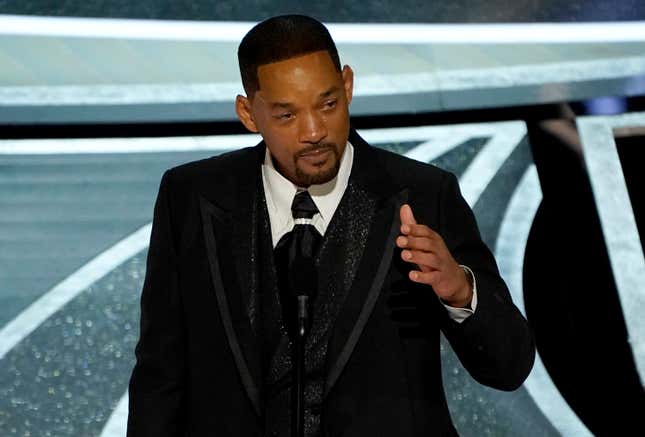
“Manhood,” a friend texted me after Will Smith’s Chris Rock slap at the Oscars, “often comes down to weighing the moment against the future.”
The sender was Jimi Izrael, a writer who has been criticized as misogynist in his own work but who I once talked out of assaulting another writer who Jimi believed disrespected his late wife, the former NPR producer Temisha Walker, in an obituary after her 2013 death from cancer. Few things raise a man’s impulse toward violence like an attack–real or perceived–on our families. When it’s the women we love, the Black women who we’ve watched bear the scars of a lifetime of accumulated slights, the fuse is even shorter.
But the thing about short fuses is they end in quick explosions that damage everyone nearby, including those we intended to shield from the blast. Smith’s assault of Rock and Jimi’s text crystallized a question many of us have had to interrogate: what does protecting Black women really look like? Does accountability for words always have to be meted out in violence, and if so, who accounts for the collateral damage?
Those are questions Will Smith may never have to answer. Whatever motivated him to roll on Chris Rock, his attack happened in a sterile environment where potential repercussions were minimal. Rock has said he won’t file a police report. The LAPD says it’s not investigating. Oscars security let him stay through the ceremony, in the front row, like nothing happened.
That’s not how it works when most of us choose violence. Unfortunately, many Black men spend a lifetime navigating when to make that choice, from defending ourselves on the street or in the workplace to taking up for our mothers, sisters, aunts or daughters when others mistreat them. I don’t know many men who’ve never had to make that choice. I made it as recently as a month ago, when a meaningless exchange of words in a Walmart parking lot triggered a snap judgment that I needed to protect my fiancee and 18-month-old. I wanted to hurt the man; I let him know, loudly, that I would. I spent the next several hours trying to convince a woman I couldn’t care more deeply about that in my judgment, it was all in her best interest.
In hers, it was terrifying. What would our son, who already emulates everything I do, take from that exchange? What if the police got involved and I, a six-foot-four inch, 220-lb, violently angry Black man became the center of their attention? What if the other guy had a gun and the last time I endeavored to protect them was really the last time? What I’d spent a lifetime developing as a response to even slight aggression became a liability in the eyes of the person I’m closest to.
She wasn’t wrong, but while I disagree with how Smith handled the Chris Rock situation as poorly as humanly possible, his response still, oddly, resonated. Maybe it was a reflection of the work I still need to do to avoid another flare up like the one in the parking lot, or that somewhere deep, I don’t abhor what Smith did as much as I tell myself I do.

